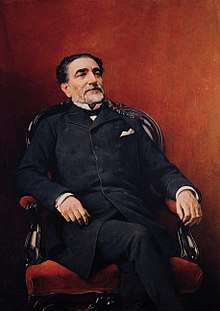Práxedes Mateo Sagasta
Práxedes Mariano Mateo Sagasta y Escolar (21 July 1825 – 5 January 1903) was a Spanish civil engineer and politician who served as Prime Minister on eight occasions between 1870 and 1902—always in charge of the Liberal Party—as part of the turno pacifico, alternating with the Conservative leader Antonio Cánovas. He was known as an excellent orator.
Práxedes Mateo Sagasta | |
|---|---|
 Portrait of Práxedes Mateo Sagasta | |
| Prime Minister of Spain | |
| In office 7 March 1901 – 10 December 1902 | |
| Monarch |
|
| Preceded by | Marcelo Azcárraga |
| Succeeded by | Francisco Silvela |
| In office 5 October 1897 – 7 March 1899 | |
| Monarch | Maria Christina of Austria (regent) |
| Preceded by | Marcelo Azcárraga |
| Succeeded by | Francisco Silvela |
| In office 13 December 1892 – 24 March 1895 | |
| Monarch | Maria Christina of Austria (regent) |
| Preceded by | Antonio Cánovas del Castillo |
| Succeeded by | Antonio Cánovas del Castillo |
| In office 28 November 1885 – 8 July 1890 | |
| Monarch | Maria Christina of Austria (regent) |
| Preceded by | Antonio Cánovas del Castillo |
| Succeeded by | Antonio Cánovas del Castillo |
| In office 10 February 1881 – 14 October 1883 | |
| Monarch | Alfonso XII |
| Preceded by | Antonio Cánovas del Castillo |
| Succeeded by | José Posada Herrera |
| Personal details | |
| Born | 21 July 1825 Torrecilla en Cameros, Logroño, Spain |
| Died | 5 January 1903 (aged 77) Madrid, Spain |
| Nationality | Spanish |
| Political party | Liberal Party |
| Signature | |
Biography
Mateo-Sagasta was born on 21 July 1825 at Torrecilla en Cameros, province of Logroño, Spain. As a member of the Progressive Party while a student at the Civil Engineering School of Madrid in 1848, Sagasta was the only one in the school who refused to sign a letter supporting Queen Isabel II.
After his studies, he took an active role in government. Sagasta served in the Spanish Cortes between 1854–1857 and 1858–1863. In 1866 he went into exile in France after a failed coup. After the Spanish Revolution of 1868, he returned to Spain to take part in the newly-created provisional government.
He served as Prime Minister of Spain during the Spanish–American War of 1898 when Spain lost its remaining colonies. Sagasta agreed to an autonomous constitution for both Cuba and Puerto Rico. Sagasta's political opponents saw his action as a betrayal of Spain and blamed him for the country's defeat in the war and the loss of its island territories in the Treaty of Paris of 1898. He continued to be active in politics for another four years.
Sagasta died on 5 January 1903 in Madrid.[1]
References
- "Obituary. Señor Práxedes Mateo Sagasta". Annual Register for 1903. Longmans, Green, and Co. 1904. p. 113.
External links
| Political offices | ||
|---|---|---|
| Preceded by Luis González Bravo |
Minister of Government 1868-1870 |
Succeeded by Nicolás María Rivero |
| Preceded by Juan de Zavala y de la Puente |
Prime Minister of Spain 1874 |
Succeeded by Antonio Cánovas del Castillo |
| Preceded by Antonio Cánovas del Castillo |
Prime Minister of Spain 1881-1883 |
Succeeded by José Posada Herrera |
| Preceded by Antonio Cánovas del Castillo |
Prime Minister of Spain 1885-1890 |
Succeeded by Antonio Cánovas del Castillo |
| Preceded by Antonio Cánovas del Castillo |
Prime Minister of Spain 1892-1895 |
Succeeded by Antonio Cánovas del Castillo |
| Preceded by Marcelo Azcárraga |
Prime Minister of Spain 1897-1899 |
Succeeded by Francisco Silvela |
| Preceded by Marcelo Azcárraga |
Prime Minister of Spain 1901-1902 |
Succeeded by Francisco Silvela |
| Party political offices | ||
| Preceded by Party created |
Leader of the Liberal Party 1876–1902 |
Succeeded by Eugenio Montero Ríos |